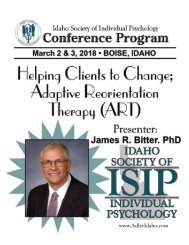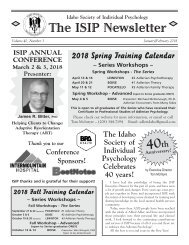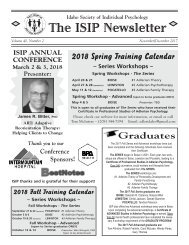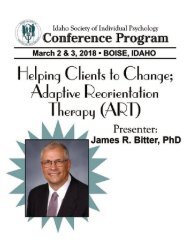June 2022 ISIP Newsletter
Create successful ePaper yourself
Turn your PDF publications into a flip-book with our unique Google optimized e-Paper software.
He was noted to be very caring and attentive with
children. Adler observed, “I have investigated what
children in poor neighborhoods feared the most,
and found that in most cases, it was whipping”. is
recognition of the hardships of childhood poverty,
along with other observations, led Adler to develop
child guidance principles based on the assumption of
equality and mutual respect. Adler felt it important
that children learn at a young age that they possess
‘equality of being’ – that they are each a contributing
and important part of life, and that they are connected
to others.
Contributing to Common Sense
by: Ted Warstadt
Recently members of Idaho’s Adlerian
organization have inquired as to what ISIP’s direction
might be in ameliorating issues of social justice and
the marginalization of various groups. is article
does not suggest a position statement for ISIP on
social justice or other maladies facing local, county,
state or national social issues; it simply provides some
of Alfred Adler’s teachings, most of which are in his
own words, to perhaps guide an individual’s efforts as
they seek to maintain and teach equality and mutual
respect.
Across the world we see numerous situations of social
injustice. Many examples of marginalization can be
found with individuals, groups, races, religions, tribes,
political groups and even
whole countries. Alfred
Adler was particularly
empathic regarding the
need to support the
marginalized.
Ted Warstadt
6
Adler began his career
as a physician, and he
worked mainly with
the poor in Vianna.
A term Adler frequently used to identify optimal
wellness in social and societal functioning is ‘common
sense’ – the common weal, the good of society. Sophie
DeVries, one of Adler’s students, reected on Adler’s
idea of common sense in these words: “ere is quite a
bit of difference, between intelligence, that is used for
personal goals, and common sense, which is ‘meaning’
that is of benet to mankind.” Common sense
encompasses the good of all as opposed to the ‘private
logic’ which is self-interested and egoic. Adler referred
to “false individualism” as those identifying themselves
as apart from others. When common sense and
private logic appose one another, emotional wellness
suffers and, oen, so do others. ose who are in
relationships with a selsh or despotic person oen
pay a heavy emotional price for that involvement. In
a lecture given in Berlin, June 7, 1930, Adler quipped,
“Up to now, common sense has been under-valued out
of misunderstanding, especially by those who are not
well endowed with it”. at message is applicable to
our current national and world situation.
Alfred Adler used the term gemeinshasguful to
describe social feeling. In an effort to more fully dene
social feeling (gemeinshasguful), he stated “I have
found in an English author a phrase which expresses
clearly what could contribute to our explanation. ‘To
see with the eyes of another, to hear with the ears
of another, to feel with the heart of another.’ For the
time being, this seems to me an admissible denition
of what we call social feeling”. Adler felt strongly
that optimal mental health was closely aligned with
one’s interest in their fellow beings and he warned of
maladies that occur when individuals act selshly. He
















